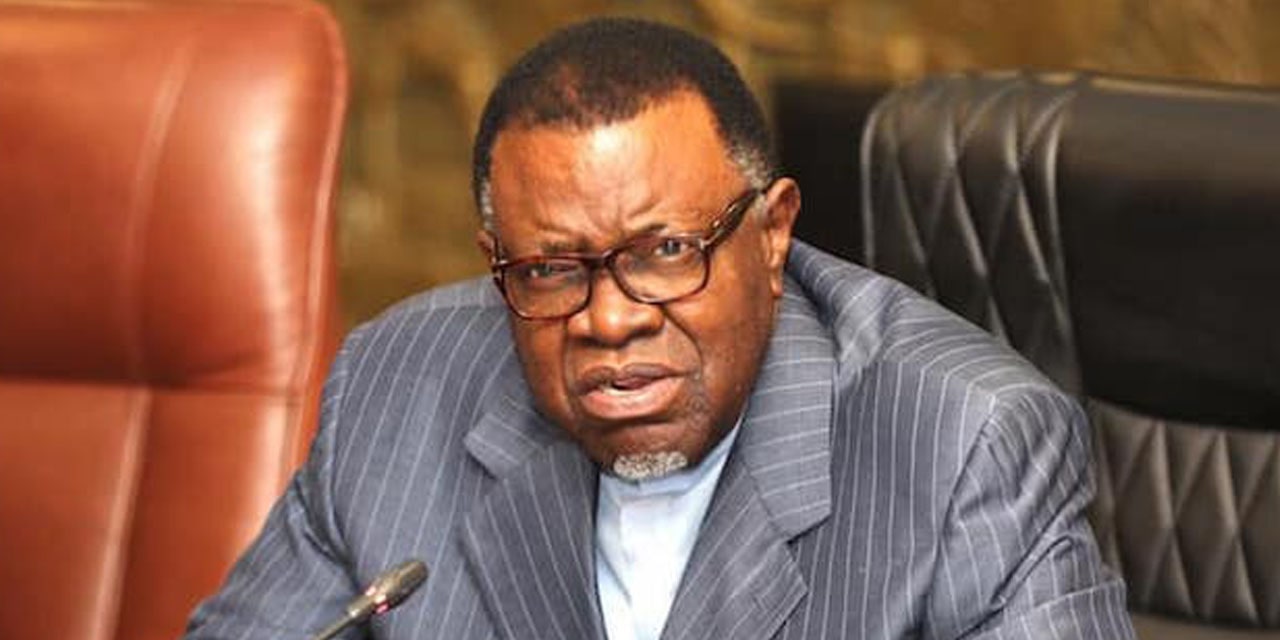Eba Kandovazu
AS of midnight, the wearing of masks in public will no longer be compulsory and the gathering of people has been increased from 500 to 1000, while fully vaccinated travellers will not be required to provide negative PCR results upon entering the country.
These were the Covid-19 relaxed health measures announced today by President Hage Geingob, who also said that recently the World Health Organisation adjusted the Covid 19 outbreak from a pandemic to an endemic disease.
“A reprieve does not mean the end of the pandemic. We must continue to care for ourselves and the vulnerable members of our society who are more susceptible, by continuing to protect ourselves so that new clusters of infection do not form. The abolishment of the mandatory face mask mandate, does not mean the abolishment of common sense. On the contrary, common-sense must continue to prevail. The Government will continue to do its part and complete the new projects brought on stream, to ensure our public health sector is sufficiently capacitated. Let us apply good judgment at all times, in our personal and public conduct and avoid recklessness that could lead to the reversal of the many gains and successes achieved to date,” Geingob cautioned.
He also said the recovery rate from Covid-19 in Namibia now stands at 97 percent, with a case fatality rate of 2,5 percent.
“Statistics further indicate that at 14 March 2022, the active cases stood at 222. As the nation may recall, there was a time during July 2021 when the active cases in the country were much higher, peaking at an all-time high of 27,046 active infections in the country. However, the reclassification of the outbreak to endemic should not give us a false sense of security. We must continue to be vigilant and alert to further control the spread and the upsurge in new cases,” the Head of State said.
According to him, the magnitude of the challenge the country faces is large, calling on effective response.
“To protect the most vulnerable members of our society and to bolster the capacity of our healthcare system so as to respond to new infections as they occur, we still require strong measures and interventions to reduce the spread of new infections.”
Over the last 30 day observance period, the positivity ratio declined from seven percent to two percent of new infections, from the total number of samples tested, countrywide, according to the statistics presented at the media briefing today.
Over the last 30-day observance period, he said, the positivity ratio declined from seven percent to two percent of new infections, from the total number of samples tested, countrywide.
Equally there has been a corresponding decline in deaths, with a total of 19 deaths recorded during the period, from Covid-19 or related illnesses. “I have been relieved lately by the daily update reports that indicated zero deaths over the past week or so,” a relieved President Geingob said.
He, however, said economic data reveals that the volume of foreign tourist arrivals remain at only one third of what they were in 2019, an indication that the employment intensive tourism sector which provides direct and indirect employment to approximately 150,000 Namibians, is still in recession.
“Vaccination remains one of the most effective measures in our multi-faceted National Response against COVID-19. It not only reduces individual chances of developing severe illness, hospitalization and death, but can also help to restore economic activity particularly in the adversely affected tourism sector. As of today March 15, 2022, nationally, only 21.4 percent of the country’s eligible population is fully vaccinated. This is one third of the WHO recommended population coverage of 60 percent to achieve national herd immunity,” he said.
Government has procured adequate vaccination stock and the country has also benefited from the generosity of friendly nations and received large consignments of donated vaccines, he stressed, adding that scarce resources should not be allowed to waste by expiring on the shelves.
“I, therefore, reiterate my call for all eligible Namibians to get vaccinated and for those who have already received initial jabs, to get their booster shots, so as to ensure that the immunity does not wane, especially as we face the winter months. The approaching winter, when people tend to be confined indoors, pose a natural risk to the spread of respiratory diseases. We must therefore remain vigilant to prevent the spread of new infection that could overwhelm our healthcare system,” he said.




